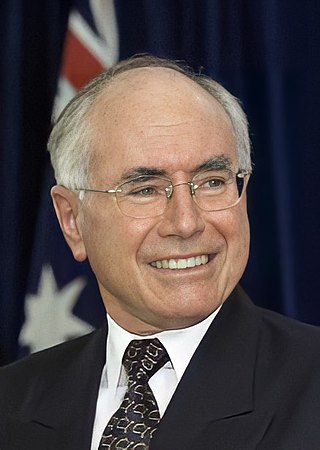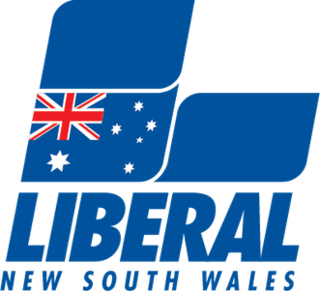The Australia Party was a minor political party established initially in 1966 as the Liberal Reform Group. As the Australia Party, it became influential, particularly in the landmark 1972 federal election when its preferences assisted the Australian Labor Party to victory—ending 23 years of Liberal/Country Coalition government.
Frederick John Nile is an Australian former politician and ordained Christian minister. Nile was a member of the New South Wales Legislative Council from 1981-2023, except for a period in 2004. Nile was re-elected at the 1991, 1999, 2007, and 2015 state elections and served as the Assistant President of the Legislative Council between 2007 and 2019. Nile lost his seat at the 2023 New South Wales state election, after four decades of being in parliament.

The 2004 Australian federal election was held in Australia on 9 October 2004. All 150 seats in the House of Representatives and 40 seats in the 76-member Senate were up for election. The incumbent Liberal Party of Australia led by Prime Minister of Australia John Howard and coalition partner the National Party of Australia led by John Anderson defeated the opposition Australian Labor Party led by Mark Latham.

The Australia First Party (AFP), officially known as the Australia First Party (NSW) Incorporated, is an Australian nationalist political party founded in 1996 by Graeme Campbell, a former member of the Australian Labor Party. The policies of the party have been described as nationalist, anti-multicultural and economically protectionist, advocating for strict immigration controls, the prioritization of Australian citizens in employment, and the promotion of Australian culture and values. The party's logo includes the Southern Cross of the Eureka Flag.
Cheryl Zena Kernot is an Australian politician, academic, and political activist. She was a member of the Australian Senate representing Queensland for the Australian Democrats from 1990 to 1997, and the fifth leader of the Australian Democrats from 1993 to 1997. In 1997, she resigned from the Australian Democrats, joined the Australian Labor Party, and won the seat of Dickson at the 1998 federal election. She was defeated at the 2001 federal election. Kernot was an unsuccessful independent candidate to represent New South Wales in the Australian Senate in the 2010 federal election.

The Christian Democratic Party (CDP) was a Christian democratic political party in Australia, founded in 1977, under the name Call to Australia Party, by a group of Christian ministers in New South Wales. One of the co-founders, Fred Nile, a Congregational Church minister, ran as their upper house candidate in the NSW State election. The Christian Democratic Party's platform espoused social conservatism. It changed its name in 1998.

The Shooters, Fishers and Farmers Party (SFF) is a conservative Australian political party. It primarily advocates for increased funding and services for rural and regional Australia, protecting the right to farm, enhancing commercial and recreational fishing, tougher sentencing for illegal firearm trade and usage, and relaxing gun control for law abiding citizens.

Sir Raphael West Cilento, often known as "Ray", was an Australian medical practitioner and public health administrator.

The New South Wales Liberal Party, officially called the Liberal Party of Australia, New South Wales Division, and colloquially known as the NSW Liberal Party, is the state division of the Liberal Party of Australia in New South Wales. The party is currently in Opposition in New South Wales in a coalition with the National Party. The party is part of the federal Liberal Party which is in opposition on the mainland of Australia, with Tasmania being the exception.

The 1990 Australian federal election was held in Australia on 24 March 1990. All 148 seats in the House of Representatives and 40 seats in the 76-member Senate were up for election. The incumbent Australian Labor Party, led by Bob Hawke, defeated the opposition Liberal Party of Australia, led by Andrew Peacock, with its coalition partner, the National Party of Australia, led by Charles Blunt, despite losing the nationwide popular and two-party-preferred vote. The result saw the re-election of the Hawke government for a fourth successive term.

The Libertarian Party, formerly known as the Liberal Democratic Party (LDP), is an Australian political party founded in Canberra in 2001. The party espouses smaller government and supports policies that are based on classical liberal, libertarian principles, such as lower taxes, opposing restrictions on civil liberties, decentralisation, utilising nuclear energy, and the relaxation of smoking laws.
The Unite Australia Party (UAP) was a short-lived Australian political party that existed in the late 1980s.
This article provides details on candidates who stood at the 2007 Australian federal election.
The Liberal Democratic Party (LDP) was an Australian breakaway political party of the United Australia Party that contested the 1943 federal election and the 1944 New South Wales state election. Formed in 1943, it was replaced by the New South Wales division of the Liberal Party of Australia in January 1945.

Charles Wilfred Russell was an Australian politician, pastoralist and right wing activist who served briefly in both the Queensland and federal parliaments. Initially a member of the Country Party, he later became one of its key critics and campaigned actively against it in the 1950s and 1960s. His successful court action invalidating the Queensland government's stock levy in 1977, in the last year of his life, was one of his most significant achievements.
A by-election was held for the Australian House of Representatives seat of Richmond on 18 February 1984. This was triggered by the resignation of National Party Leader MP Doug Anthony. The by-election was held to coincide with the Corangamite and Hughes by-elections.
Glenn William Druery is an Australian political strategist, electoral campaigner and ultra-distance cyclist. He has played a leading role in the electoral success of various micro and minor parties in Australia since the mid-1990s.

The 1944 New South Wales state election was held on 27 May 1944. It was conducted in single member constituencies with compulsory preferential voting and was held on boundaries created at a 1940 redistribution. The election was for all of the 90 seats in the Legislative Assembly.

The United Australia Party (UAP), formerly known as Clive Palmer's United Australia Party and the Palmer United Party (PUP), is an Australian political party formed by mining magnate Clive Palmer in April 2013. The party was deregistered by the Australian Electoral Commission in 2017, revived and re-registered in 2018, and voluntarily deregistered in 2022. The party fielded candidates in all 150 House of Representatives seats at the 2013 federal election. Palmer, the party's leader, was elected to the Division of Fairfax and it reached a peak of three senators following the rerun of the Western Australian senate election in 2014. When the party was revived under its original name in 2018, it was represented by ex-One Nation senator Brian Burston in the federal parliament.
The Independent Democratic Party (IDP), sometimes referred to as the Independent Democratic Group, the Queensland Democratic Party or simply the Democratic Party, was an Australian political party that was active in the mid-1950s. It was led by public health administrator Raphael Cilento.













